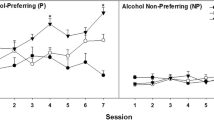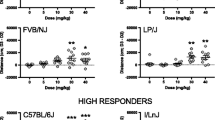Abstract
Rationale: Some theories have advanced a role for both locomotor sensitization and tolerance in the reinforcing properties of drugs. The present studies used selected lines of mice to assess genetic correla- tions among ethanol drinking, ethanol locomotor sensitization, and tolerance to the depressant effects of ethanol. Objectives: Ethanol-naive high- and low-alcohol preferring (HAP and LAP) selected lines of mice were tested for locomotor sensitization to ethanol and acquisition of acute functional tolerance to ethanol using the static dowel test. Methods: For the locomotor sensitization study, mice received four i.p. injections of one of five doses of ethanol (0–3.5 g/kg) at 48-h intervals. On the sensitization test day, 48 h after the last drug administration day, all mice received a 2.0-g/kg ethanol injection. Other mice from the same lines were subjected to a two-injection (3.75 g/kg total), acute functional tolerance procedure assessing disruption of balance on a static dowel. Results: Lines differed neither in the acute locomotor activating nor depressant effects of ethanol. Additionally, neither line’s response to the depressant effect of 3.5 g/kg ethanol changed with repeated injection. However, locomotor sensitization was seen in HAP but not LAP mice that had received 2.75 g/kg or 3.5 g/kg ethanol during repeated administration. Both HAP and LAP mice acquired equivalent acute functional tolerance, as measured by an increase in blood ethanol concentration between the first and second recovery measures. Conclusions: Overall, these findings imply that high ethanol consumption in mice appears to be genetically related to ethanol locomotor sensitization. Additionally, ethanol locomotor sensitization does not appear to be related to tolerance to the depressant effects of ethanol. These findings support a role for sensitization in high alcohol-seeking behavior in mice.
Similar content being viewed by others
Author information
Authors and Affiliations
Additional information
Received: 28 October 1999 / Accepted: 20 January 2000
Rights and permissions
About this article
Cite this article
Grahame, N., Rodd-Henricks, K., Li, TK. et al. Ethanol locomotor sensitization, but not tolerance correlates with selection for alcohol preference in high- and low-alcohol preferring mice. Psychopharmacology 151, 252–260 (2000). https://doi.org/10.1007/s002130000388
Issue Date:
DOI: https://doi.org/10.1007/s002130000388




